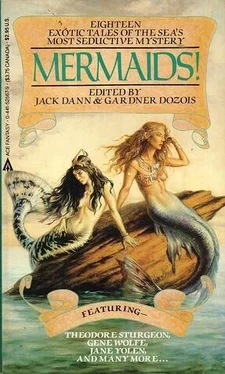Гарднер Дозуа - Mermaids!
Здесь есть возможность читать онлайн «Гарднер Дозуа - Mermaids!» весь текст электронной книги совершенно бесплатно (целиком полную версию без сокращений). В некоторых случаях можно слушать аудио, скачать через торрент в формате fb2 и присутствует краткое содержание. Год выпуска: 1986, ISBN: 1986, Издательство: Ace, Жанр: Фантастика и фэнтези, на английском языке. Описание произведения, (предисловие) а так же отзывы посетителей доступны на портале библиотеки ЛибКат.
- Название:Mermaids!
- Автор:
- Издательство:Ace
- Жанр:
- Год:1986
- ISBN:0-441-52567-9
- Рейтинг книги:5 / 5. Голосов: 1
-
Избранное:Добавить в избранное
- Отзывы:
-
Ваша оценка:
- 100
- 1
- 2
- 3
- 4
- 5
Mermaids!: краткое содержание, описание и аннотация
Предлагаем к чтению аннотацию, описание, краткое содержание или предисловие (зависит от того, что написал сам автор книги «Mermaids!»). Если вы не нашли необходимую информацию о книге — напишите в комментариях, мы постараемся отыскать её.
Mermaids! — читать онлайн бесплатно полную книгу (весь текст) целиком
Ниже представлен текст книги, разбитый по страницам. Система сохранения места последней прочитанной страницы, позволяет с удобством читать онлайн бесплатно книгу «Mermaids!», без необходимости каждый раз заново искать на чём Вы остановились. Поставьте закладку, и сможете в любой момент перейти на страницу, на которой закончили чтение.
Интервал:
Закладка:
Driftglass
by Samuel R. Delany
It is not surprising that humans are fascinated by the sea—we came from the sea, after all, as did all life, and our bodies, which are more than ninety percent water, respond to the moon's phases with the same rhythm as the tides. For thousands of years, people have lived near the sea, and on the sea, and taken their living from the sea . .. and dreamed of what it would be like to live beneath the sea as well. In the brilliant and evocative story that follows, we are taken to a future world where this age-old dream has been fulfilled by sophisticated medical technology, and surgically-created merfolk are renouncing the land for the mystery and danger and endless bountiful promise of the sea....
Samuel R. Delany was widely acknowledged during the sixties as one of the two most important and influential American SF writers of that decade (the other was Roger Zelazny). By 1969, critic Algis Budrys was calling Delany "the best science-fiction writer in the world," and he is still regarded by many critics as one of the genre's greatest living authors. He has won four Nebula Awards and a Hugo Award. His books include The Einstein Intersection, Babel-17, Nova, The Fall of the Towers, Triton, the controversial bestseller Dhalgren, and the landmark collection Driftglass. His most recent books are Tales of Neveryon, and the novel Stars In My Pocket Like Grains of Sand.
SOMETIMES I GO DOWN TO THE PORT, SPLASHING SAND WITH my stiff foot at the end of my stiff leg locked in my stiff hip, with the useless arm a-swinging, to get wet all over again, drink in the dives with old cronies ashore, feeling old, broken, sorry for myself, laughing louder and louder. The third of my face that was burned away in the accident was patched with skin grafts from my chest, so what's left of my mouth distorts all loud sounds; sloppy sartorial reconstruction. Also I have a hairy chest. Chest hair does not look like beard hair, and it grows all up under my right eye. And: my beard is red, my chest hair brown, while the thatch curling down over neck and ears is sun-streaked to white here, darkened to bronze there, 'midst general blondness.
By reason of my being a walking (I suppose my gait could be called headlong limping) horror show, plus a general inclination to sulk, I spend most of the time up in the wood and glass and aluminum house on the surf-sloughed point that the Aquatic Corp gave me along with my pension. Rugs from Turkey there, copper pots, my tenor recorder which I can no longer play, and my books.
But sometimes, when the gold fog blurs the morning, I go down to the beach and tromp barefoot in the wet edging of the sea, searching for driftglass.
It was foggy that morning, and the sun across the water moiled the mists like a brass ladle. I lurched to the top of the rocks, looked down through the tall grasses into the frothing inlet where she lay, and blinked.
She sat up, long gills closing down her neck and the secondary slits along her back just visible at their tips because of much hair, wet and curling copper, falling there. She saw me. "What are you doing here, huh?" She narrowed blue eyes.
"Looking for driftglass."
"What?"
"There's a piece." I pointed near her and came down the rocks like a crab with one stiff leg.
"Where?" She turned over, half in, half out of the water, the webs of her fingers cupping nodules of black stone.
While the water made cold overtures between my toes, I picked up the milky fragment by her elbow where she wasn't looking. She jumped, because she obviously had thought it was somewhere else.
"See?"
"What... what is it?" She raised her cool hand to mine. For a moment the light through the milky gem and the pale film of my own webs pearled the screen of her palms. (Details like that. Yes, they are the important things, the points from which we suspend later pain.) A moment later wet fingers closed to the back of mine.
"Driftglass," I said. "You know all the Coca-Cola bottles and cut crystal punch bowls and industrial silicon slag that goes into the sea?"
"I know the Coca-Cola bottles."
"They break, and the tide pulls the pieces back and forth over the sandy bottom, wearing the edges, changing their shape. Sometimes chemicals in the glass react with chemicals in the ocean to change the color. Sometimes veins work their way through a piece in patterns like snowflakes, regular and geometric; others, irregular and angled like coral. When the pieces dry they're milky. Put them in water and they become transparent again."
"Ohhh!" She breathed as though the beauty of the blunted triangular fragment in my palm assailed her like perfume. Then she looked at my face, blinking the third, aqueous-filled lid that we use as a correction lens for underwater vision.
She watched the ruin calmly.
Then her hand went to my foot where the webs had been torn back in the accident. She began to take in who I was. I looked for horror, but saw only a little sadness.
The insignia on her buckle—her stomach was making little jerks the way you always do during the first few minutes when you go from breathing water to air—told me she was a Biological Technician. (Back up at the house there was a similar uniform of simulated scales folded in the bottom drawer of the dresser and the belt insignia said Depth Gauger.) I was wearing some very frayed jeans and a red cotton shirt with no buttons.
She reached up to my neck, pushed my collar back from my shoulders and touched the tender slits of my gills, outlining them with cool fingers. "Who are you?" Finally.
"Cal Svenson."
She slid back down in the water. "You're the one who had the terrible—but that was years ago. They still talk about it, down—" She stopped.
As the sea softens the surface of a piece of glass, so it blurs the souls and sensibilities of the people who toil beneath her. And according to the last report of the Marine Reclamation Division there are to date seven hundred and fifty thousand who have been given gills and webs and sent under the foam where there are no storms, up and down the American coast.
"You live on shore? I mean around here? But so long ago..."
"How old are you?"
"Sixteen."
"I was two years older than you when the accident happened."
"You were eighteen?"
"I'm twice that now. Which means it happened almost twenty years ago. It is a long time."
"They still talk about it."
"I've almost forgotten," I said. "I really have. Say, do you play the recorder?"
"I used to."
"Good! Come up to my place and look at my tenor recorder. And I'll make some tea. Perhaps you can stay for lunch—"
"I have to report back to Marine Headquarters by three. Tork is going over the briefing to lay the cable for the big dive, with Jonni and the crew." She paused, smiled. "But I can catch the undertow and be there in half an hour if I leave by two-thirty."
On the walk up I learned her name was Ariel. She thought the patio was charming, and the mosaic evoked, "Oh, look!" and "Did you do this yourself?" a half-dozen times. (I had done it, in the first lonely years.) She picked out the squid and the whale in battle, the wounded shark and the diver. She told me she didn't get time to read much, but she was impressed by all the books. She listened to me reminisce. She talked a lot to me about her work, husbanding the deep-down creatures they were scaring up. Then she sat on the kitchen stool, playing a Lukas Foss serenade on my recorder, while I put rock salt in the bottom of the broiler tray for two dozen oysters Rockefeller, and the tea water whistled. I'm a comparatively lonely guy. I like being followed by beautiful young girls.
Читать дальшеИнтервал:
Закладка:
Похожие книги на «Mermaids!»
Представляем Вашему вниманию похожие книги на «Mermaids!» списком для выбора. Мы отобрали схожую по названию и смыслу литературу в надежде предоставить читателям больше вариантов отыскать новые, интересные, ещё непрочитанные произведения.
Обсуждение, отзывы о книге «Mermaids!» и просто собственные мнения читателей. Оставьте ваши комментарии, напишите, что Вы думаете о произведении, его смысле или главных героях. Укажите что конкретно понравилось, а что нет, и почему Вы так считаете.











![Гарднер Дозуа - Книга Мечей (сборник) [litres с оптимизированной обложкой]](/books/427839/gardner-dozua-kniga-mechej-sbornik-litres-s-opti-thumb.webp)